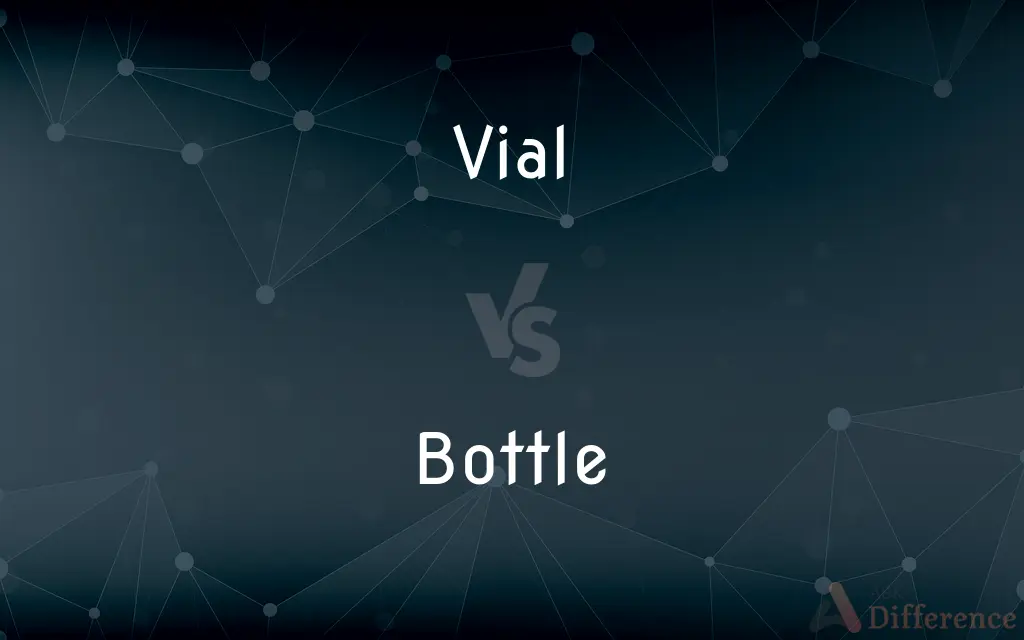Vial vs. Bottle — What's the Difference?
By Tayyaba Rehman — Updated on August 5, 2024
A vial is a small glass or plastic container for liquids, often used for medicinal samples. A bottle is a larger, more versatile container for storing liquids.

Difference Between Vial and Bottle
Table of Contents
ADVERTISEMENT
Key Differences
A vial is typically a small container made of glass or plastic designed to hold a small amount of liquid, usually for medicinal or laboratory use. Vials are often sealed with a stopper or cap. They are commonly used to contain samples, vaccines, or other medications that are dispensed in precise, small quantities. In contrast, a bottle is a more general term for any container with a neck that is narrower than the body and a mouth. Bottles can be made of various materials such as glass, plastic, or metal and come in a wide range of sizes. They are used for a multitude of purposes, from storing beverages to household chemicals.
Vials are often used in a scientific context or where precise dosages are required, such as in hospitals or research labs. They are small enough to be easily stored in large numbers within a compact space. Vials may also be used to store samples for testing, ensuring that the contents are not contaminated.
Bottles have a broader use and are not limited to scientific or medical applications. They are commonplace in daily life, found in personal care products, drinks, condiments, and more. The design of a bottle can vary significantly, with some having wide mouths for easy access or others designed for dispensing controlled amounts of liquid.
Durability can differ between vials and bottles based on their intended use. Vials, which are often used once and then disposed of or recycled, might be made of thinner material. Bottles, meant for longer-term use or for contents that require more protection, might be constructed from thicker glass or high-density plastic.
Comparison Chart
Size
Small, holds minimal volume
Larger, holds more volume
ADVERTISEMENT
Usage
Medical, laboratory samples
Beverages, storage, wide-ranging uses
Material
Often glass or plastic
Glass, plastic, metal, etc.
Closure
Sealed with a stopper or cap
Usually screw cap or cork
Shape
Typically cylindrical with a narrow opening
Varied shapes, wider necks, and bodies
Compare with Definitions
Vial
A small container for holding liquid substances.
The nurse filled the vial with the patient's blood sample.
Bottle
A container with a neck for holding liquids.
He recycled the empty water bottle.
Vial
A container for storing medicinal fluids.
The vaccine vials were stored at a controlled temperature.
Bottle
A bottle is a narrow-necked container made of an impermeable material (clay, glass, plastic, aluminium etc.) in various shapes and sizes to store and transport liquids (water, milk, beer, wine, ink, cooking oil, medicine, soft drinks, shampoo, and chemicals, etc.) and whose mouth at the bottling line can be sealed with an internal stopper, an external bottle cap, a closure, or a conductive "inner seal" using induction sealing. Some of the earliest bottles appeared in China, Phoenicia, Crete, and Rome.
Vial
A small tube-shaped container used for samples.
The scientist added the reagent to a series of vials.
Bottle
A receptacle having a narrow neck, usually no handles, and a mouth that can be plugged, corked, or capped.
Vial
A glass or plastic vessel used in laboratories.
He carefully labeled each vial with its corresponding chemical.
Bottle
The quantity that a bottle holds.
Vial
A tiny bottle meant for a single dose of medication.
She pulled out a vial of insulin from her bag.
Bottle
A receptacle filled with milk or formula that is fed, as to babies, in place of breast milk.
Vial
A vial (also known as a phial or flacon) is a small glass or plastic vessel or bottle, often used to store medication as liquids, powders or capsules. They can also be used as scientific sample vessels; for instance, in autosampler devices in analytical chromatography.
Bottle
Intoxicating liquor
Don't take to the bottle.
Vial
A small container, usually with a closure, used especially for liquids.
Bottle
The practice of drinking large quantities of intoxicating liquor
Her problem is the bottle.
Vial
To put or keep in or as if in a vial.
Bottle
To place in a bottle.
Vial
A glass vessel or bottle, especially a small tube-shaped bottle used to store medicine, perfume or other chemicals.
Bottle
To hold in; restrain
Bottled up my emotions.
Vial
(transitive) To put or keep in, or as in, a vial.
Bottle
A container, typically made of glass or plastic and having a tapered neck, used primarily for holding liquids.
Beer is often sold in bottles.
Vial
A small bottle, usually of glass; a little glass vessel with a narrow aperture intended to be closed with a stopper; as, a vial of medicine.
Take thou this vial, being then in bed,And this distilled liquor drink thou off.
Bottle
The contents of such a container.
I only drank a bottle of beer.
Vial
To put in a vial or vials.
Bottle
A container with a rubber nipple used for giving liquids to infants, a baby bottle.
The baby wants a bottle.
Vial
A small bottle that contains a drug (especially a sealed sterile container for injection by needle)
Bottle
(originally "bottle and glass" as rhyming slang for "arse") Nerve, courage.
You don’t have the bottle to do that!
He was going to ask her out, but he lost his bottle when he saw her.
Bottle
A container of hair dye, hence with one’s hair color produced by dyeing.
Did you know he’s a bottle brunette? His natural hair color is strawberry blonde.
Bottle
(obsolete) A bundle, especially of hay; something tied in a bundle.
Bottle
(figurative) Intoxicating liquor; alcohol.
To drown one’s troubles in the bottle
To hit the bottle
Bottle
A dwelling; habitation.
Bottle
A building; house.
Bottle
(transitive) To seal (a liquid) into a bottle for later consumption. Also fig.
This plant bottles vast quantities of spring water every day.
Bottle
To feed (an infant) baby formula.
Because of complications she can't breast feed her baby and so she bottles him.
Bottle
To refrain from doing (something) at the last moment because of a sudden loss of courage.
The rider bottled the big jump.
Bottle
To throw away a leading position.
Liverpool bottled the Premier League.
Bottle
To strike (someone) with a bottle.
He was bottled at a nightclub and had to have facial surgery.
Bottle
To pelt (a musical act on stage, etc.) with bottles as a sign of disapproval.
Meat Loaf was once bottled at Reading Festival.
Bottle
Of pages printed several on a sheet: to rotate slightly when the sheet is folded two or more times.
Bottle
A hollow vessel, usually of glass or earthenware (but formerly of leather), with a narrow neck or mouth, for holding liquids.
Bottle
The contents of a bottle; as much as a bottle contains; as, to drink a bottle of wine.
Bottle
Fig.: Intoxicating liquor; as, to drown one's reason in the bottle.
Bottle
A bundle, esp. of hay.
Bottle
To put into bottles; to inclose in, or as in, a bottle or bottles; to keep or restrain as in a bottle; as, to bottle wine or porter; to bottle up one's wrath.
Bottle
Glass or plastic vessel; cylindrical with a narrow neck; no handle
Bottle
The quantity contained in a bottle
Bottle
Store (liquids or gases) in bottles
Bottle
Put into bottles;
Bottle the mineral water
Bottle
A receptacle with a narrow mouth suitable for storing drinks.
She took a sip from her glass bottle of soda.
Bottle
A portable vessel for liquids with a closure cap.
The message was found in a bottle at sea.
Bottle
A container often used for packaging in the beverage industry.
The factory produced thousands of plastic bottles daily.
Bottle
A liquid storage unit with various capacity options.
They kept a bottle of champagne chilled for the celebration.
Common Curiosities
What defines a vial?
A vial is a small container used to store liquids, typically for medical or laboratory use.
Is a bottle reusable?
Many bottles are designed to be reusable, depending on the material and construction.
What is the purpose of a vial's narrow opening?
A vial's narrow opening helps control the dispensing of its contents and maintains sterility.
How large is a typical bottle?
Bottle sizes can vary widely, from small single-serving sizes to large multi-liter containers.
Do vials come with a dispensing mechanism?
Vials usually do not have a dispensing mechanism; they are typically opened and used with syringes or droppers.
Are vials used for vaccines?
Yes, vials are commonly used to hold vaccines and other injectable medications.
Can bottles be made of materials other than glass?
Yes, bottles can be made from plastic, metal, and other materials.
Is it safe to reuse a vial?
Reusing a vial can be unsafe unless it is properly sterilized, as it may carry contamination.
Are there eco-friendly bottles?
Yes, many bottles are designed to be eco-friendly and recyclable.
Can bottles be used for storing solid items?
Yes, bottles can store solids if they have a sufficiently wide mouth.
Are vials only used in medical settings?
No, vials are also used in research laboratories and other settings requiring small samples.
Can bottles have wide mouths?
Yes, some bottles have wide mouths to facilitate filling, cleaning, or dispensing of their contents.
Are vials only made of glass?
No, vials can also be made of plastic, especially for less sensitive contents.
What kinds of closures are used for bottles?
Bottles can have screw caps, corks, flip-tops, or even sprayers and pumps.
Do vials have a specific shape?
Vials are typically cylindrical, but the exact shape can vary based on use.
Share Your Discovery

Previous Comparison
Apathetic vs. Stoic
Next Comparison
Induce vs. EnticeAuthor Spotlight
Written by
Tayyaba RehmanTayyaba Rehman is a distinguished writer, currently serving as a primary contributor to askdifference.com. As a researcher in semantics and etymology, Tayyaba's passion for the complexity of languages and their distinctions has found a perfect home on the platform. Tayyaba delves into the intricacies of language, distinguishing between commonly confused words and phrases, thereby providing clarity for readers worldwide.













































